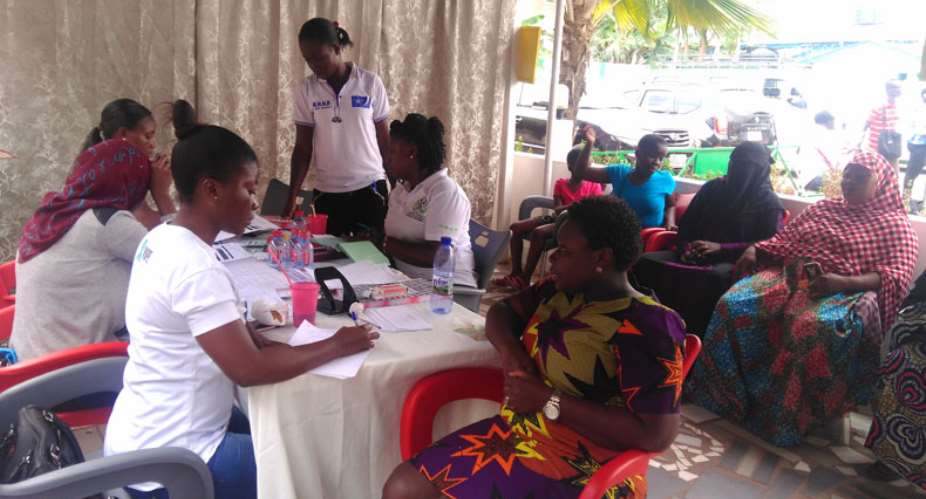Al-Hayaat Foundation, in collaboration with the Cervical Cancer Prevention & Treatment Centre of the Catholic Hospital in Battor, has organised a health education and screening for residents in the Adenta Municipality.
Cervical cancer occurs when abnormal cells on the cervix grow out of control. The cervix is the lower part of the uterus that opens into the vagina. Cervical cancer can often be successfully treated when it is found early through a pap test.
The programme was aimed at creating cervical cancer awareness, and this provided opportunity for beneficiaries to be screened for early treatment vaccination against the disease.
The Founder of the Al-Hayaat Foundation, Hajia Hanatu Abubakar, speaking to DAILY GUIDE, explained that the programme came about as a result of the frightening increasing rate of the spread of the disease.
“According to the Ghana Health Service, 3,052 women are diagnosed of cervical cancer every year, out of which 1,556 lose their lives. World Health Organisation (WHO) also projects that about 5,000 women will be diagnosed of cervical cancer, out of which 3,000 will die,” she disclosed.
Madam Hanatu stated that the screening was organised to detect early abnormalities in the cervix, adding that infected persons would not experience symptoms until the disease had reached its worse stage.
“By the time a person is diagnosed or symptoms show, the cancer would have already eaten deep into the cervices it will mean that the cancer has already been developed and nothing can be done about it,” she mentioned.
“I don't think that we have to wait until this happens. One sure way of preventing cervical cancer is by screening for detection of early abnormalities. It is when you screen that abnormal cells which left untreated can develop into cervical cancer can be detected,” she added.
Comfort Mawusi Wormenor, a nurse at the Catholic Hospital in Battor, indicated that cervical cancer is caused by a virus called human papillomavirus, or HPV and one can contract the virus through sexual activities with infected persons.
She bemoaned the expensive nature of the screening for cervical cancer, and called for a national policy for the inclusion of the screening and treatment of the cancer in the National Health Insurance Scheme (NHIS).
She said this would encourage women to avail themselves for screening to ensure early detection and treatment.
By Abigail Owiredu-Boateng





 Dumsor: Don't rush to demand timetable; the problem may be temporary — Atik Moha...
Dumsor: Don't rush to demand timetable; the problem may be temporary — Atik Moha...
 Space X Starlink’s satellite broadband approved in Ghana — NCA
Space X Starlink’s satellite broadband approved in Ghana — NCA
 2024 election will be decided on the grounds of the economy; choice of running m...
2024 election will be decided on the grounds of the economy; choice of running m...
 Dumsor: We're demanding less; just give us a timetable — Kwesi Pratt to ECG
Dumsor: We're demanding less; just give us a timetable — Kwesi Pratt to ECG
 Do I have to apologise for doing my security work, I won’t – Simon Osei-Mensah r...
Do I have to apologise for doing my security work, I won’t – Simon Osei-Mensah r...
 All my businesses have collapsed under Akufo-Addo — NDC Central regional chair
All my businesses have collapsed under Akufo-Addo — NDC Central regional chair
 Military, Prison Officers clash in Bawku, three injured
Military, Prison Officers clash in Bawku, three injured
 GRA-SML contract: MFWA files RTI request demanding KPMG report
GRA-SML contract: MFWA files RTI request demanding KPMG report
 Court threatens to call second accused to testify if NDC's Ofosu Ampofo fails to...
Court threatens to call second accused to testify if NDC's Ofosu Ampofo fails to...
 Family accuses hospital of medical negligence, extortion in death of 17-year-old...
Family accuses hospital of medical negligence, extortion in death of 17-year-old...
